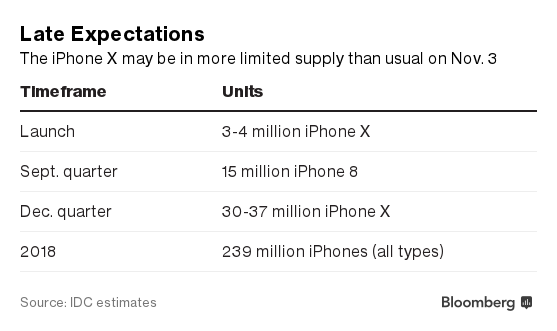 2020
2020
 2017-10-27
2017-10-27
The most important date for Apple Inc.’s iPhone X is arguably a week before the flagship smartphone actually reaches stores.
That would be Friday, when consumers can pre-order the $999 device, which will ship by Nov. 3. It’s a smart tactical move for Apple because it helps lock people in -- even though the company doesn’t collect payment until the phone actually ships.
That in turn dissuades shoppers from buying competing devices should there not be enough iPhone Xs available during the holiday shopping season. Thanks to manufacturing challenges, shortages of the 10th anniversary phone are widely expected in the coming weeks.
“Any time you can get people to pre-commit to a product that’s not available, it’s good news,” said Julie Ask, a Forrester Research analyst. “It gives you a lot of visibility, it’s less expensive than selling it to people in stores, it’s easier to tell people when it’s going to arrive.”

Investors and analysts will be able to monitor how the wait times for delivery develop in the course of Friday, giving insights into demand. As more people pre-order, delivery times will likely lengthen as Apple’s initial supply of iPhone X models is eaten up.
Given reported production bottlenecks, iPhone X delivery times will be four to six weeks by 8 a.m. New York time and should remain largely unchanged in the following days, said Gene Munster, a veteran Apple analyst and co-founder of VC firm Loup Ventures.
The iPhone X may bring customers into Apple stores who instead opt for a cheaper model, according to Madhavan Ramanujan, a consultant at Simon-Kucher & Partners. “The average customer may not buy the iPhone X,” he said. “For those who won’t, the iPhone 8 is out there and is $300 cheaper.”
Apple will report earnings Nov. 2, when it will also give guidance for the holiday quarter. Analysts expect revenue in those three months of $86 billion, up almost 10 percent from the same period a year earlier, indicating they don’t anticipate supply issues to burden sales.
The pre-order system, combined with the iPhone Upgrade Program where consumers pay a monthly fee to trade in for a new handset each year, lets Apple manage its supply chain more effectively, according to Crawford Del Prete, chief research officer of IDC. Apple can match supply to demand more effectively, he added.
While the supply chain struggles may cause shortages early on, Apple’s stock is trading near records on optimism about the iPhone X’s longer-term prospects, Del Prete said.
“Are they a problem if you take the six-quarter view? I don’t think so,” Del Prete said. “This ecosystem is so powerful."
Source: bloomberg